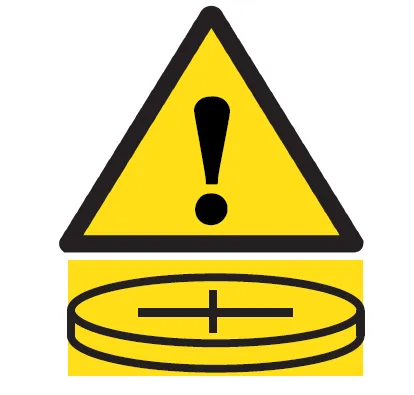
Amazon Button Cell Batteries ANSI C18.3M
Recently, Amazon US announced a notice requiring sellers to comply with new packaging and warning label regULations for button cells and coin cells.
If you sell individual button cells and coin cells on Amazon, starting from March 2, 2023, you must demonstrate compliance with child-safe packaging and warning label requirements.
Applicable Products
- Individual button cells or coin cells commonly used to power watches, desktop clocks, hearing aids, and other small devices.
Our company, Huashang Testing, has also received numerous customer inquiries regarding this.
Background
- On August 16, 2022, the U.S. President signed H.R.5313 Reese's Law, which became effective immediately. The law requires the U.S. Consumer Product Safety Commission (CPSC)to establish safety standards within one year for button cells, coin cells, and consumer products containing these batteries to protect young children from button battery hazards.
- On February 10, 2023, the CPSC issued notification G/TBT/N/USA/1964, publishing a Notice of Proposed Rulemaking (NPR)concerning packaging and safety standards for button cell or coin cell consumer products.
- Reese's Law Section 3(a)stipulates that within 180 days after the law’s enactment (i.e., February 12, 2023), the sale, offer for sale, manufacture, commercial distribution, or import into the U.S. of button cells or coin cells must comply with 16 CFR 1700.15and 16 CFR 1700.20, or other testing standards set by the Commission.
- According to Section 4 of Reese's Law, button cells or coin cells that meet the ANSI C18.3Msafety standards for portable primary lithium cells—including labeling and packaging requirements—are exempt from Section 3(a).

Scope of Applicable Products
- Reese's Law defines a “button cell or coin cell” as:
(A)A single cell whose diameter exceeds its height; or
(B)Any other cell, regardless of technology, that the Commission determines poses an ingestion hazard.
- The NPR focuses on type (A)cells, because other cells smaller in diameter than height (e.g., AAA cylindrical batteries) do not pose the same type or degree of ingestion hazard as button or coin cells.
Our Button and Coin Cell Policy
Amazon requires all button and coin cells to be tested and comply with the following regulations, standards, and requirements:
- Regulations, standards, and requirements for button cells and coin cells:
- 16 CFR Part 1700.15(Poison Prevention Packaging Standard)
- 16 CFR Part 1700.20(Special Packaging Testing Procedures)
OR one of the following:
- ANSI C18.3M(Safety Standard for Portable Primary Lithium Cells)
Notes:
- 16 CFR 1700.15 & 16 CFR 1700.20focus on packaging requirements.
- ANSI C18.3Mfocuses on battery safety requirements.
- All three standards together form a complete compliance set.
- Each battery model must be tested separately; testing a single series is not sufficient.
Labeling and Packaging Requirements for Button Cells
Warning Label Requirements:
- Clearly indicate the risk of ingestion.
- Guide consumers, where feasible, to store new and used batteries out of the REACH of children, and seek immediate medical attention if ingested, following any other consistent medical advice.
- Warning statements must be placed on product packaging, instruction manuals, and battery compartments.
Examples of Warning Labels on Battery Packaging:
- Mark warnings on battery packaging, instructing that spare batteries be kept out of children’s reach and used batteries disposed of promptly.
Example: `"BATTERY WARNING: KEEP OUT OF REACH OF CHILDREN"`
- Indicate potential hazards to young children.
- Provide clear instructions for suspected ingestion:
`"If you think batteries might have been swallowed or placed inside any part of the body, seek immediate medical attention."`
- This should also be displayed on product packaging and in manuals.
RequiRED Information
You must be aware of this information. Amazon may request it at any time, so it is recommended to have the following ready:
- Your company name (if applicable) and seller ID
- Contact information: email and phone number
- Listings of all button and coin cells on Amazon
- Product names or model numbers displayed on the product detail page
- Product descriptions and manuals
- Images showing product labels, related safety information, compliance marks, hazard warnings, and all sides of packaging
- Test reports from ISO 17025-accredited laboratoriesproving compliance with the above regulations and standards
- Test reports must include product images to verify that the tested product matches the listing
- Recognized Certificates of Conformity or Analysis Certificates (if applicable)
- Images proving compliance with:
- Poison Prevention Packaging Requirements (16 CFR 1700.15)
- Safety Label Statement Requirements (Public Law 117-171)
Email:hello@jjrlab.com
Write your message here and send it to us
 2026 EU SVHC Candidate List (253 Substances)
2026 EU SVHC Candidate List (253 Substances)
 LFGB Certification Cost and Timeline Guide
LFGB Certification Cost and Timeline Guide
 Bluetooth FCC Test Report
Bluetooth FCC Test Report
 Is FCC Testing Required?
Is FCC Testing Required?
 Where to Find FCC Test Reports
Where to Find FCC Test Reports
 LFGB Compliance Testing for Plastic Food Contact M
LFGB Compliance Testing for Plastic Food Contact M
 How to get LFGB Compliance Report for Food Grade P
How to get LFGB Compliance Report for Food Grade P
 LFGB Certification Process for Kitchenware Product
LFGB Certification Process for Kitchenware Product
Leave us a message
24-hour online customer service at any time to respond, so that you worry!




